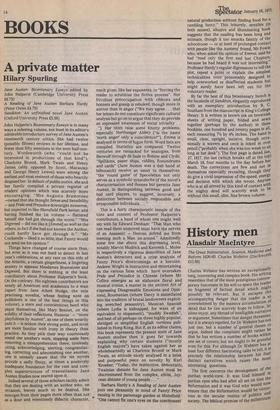BOOKS
A private matter
Hilary Spurling
Jane Austen: Bicentenary Essays edited by John Halperin (Cambridge University Press £6.75) A Reading of Jane Austen Barbara Hardy (Peter Owen £4.75) Sanditon: An unfinished novel Jane Austen (Oxford University Press £5.50)
John Halperin's Bicentenary Essays is in many ways a sobering volume, not least in its editor's admirable introductory survey of Jane Austen's nineteenth century critics. She had twelve (possibly fifteen) reviews in her lifetime, and fewer than fifty mentions in the next half-century. Wordsworth (who "could not be interested in productions of that kind"), Charlotte Brontë, Mark Twain and Henry James (ably opposed by Scott, Macaulay and George Henry Lewes) were among the earliest and most eminent of those who heartily despised her. In default of public notice, she and her family compiled a private register of readers' opinions which was scarcely more encouraging: "Mrs Augusta Bramstone —owned that she thought Sense and Sensibility — and Pride and Prejudice downright nonsense, but expected to like Mansfield Park better, and having finished the 1st volume — flattered herself she had got through the worst." "Mrs Digweed — did not like it [Emma] so well as the, others, in fact if she had not known the Author, could hardly have got through it." "Mr Cockerelle — liked it so little, that Fanny would not send me his opinion."
Things have changed of course since then, but even so it was not hard to detect in last year's celebrations, at any rate on this side of the Atlantic, a certain gingerliness, a lingering anxiety to appease Mesdames Bramstone and Digweed. But there is nothing in the least conciliatory about Professor Halperin's book. On the contrary. His eighteen contributors are nearly all American and academics to a man (apart from Jane Aiken Hodge, the sole practising novelist, whose feeling note on publishers is one of the best things in this volume), a stern and conscientious band who pique themselves, like Mary Bennet, on the solidity of their reflections. Humour — "more playfulness by Austen", as one of them wearily puts it — is seldom their strong point, and most are more familiar with irony in theory than practice. As they pick their way courteously round one another's work, stepping aside here, removing a misapprehension there, tirelessly citing, acknowledging, alerting, congratulating, correcting and admonishing one another, one is uneasily aware that the six novels provide a sadly flimsy, at times a positively inadequate foundation for the vast and complex superstructure of transatlantic Jane 'Austen Studies now reared upon it.
Indeed several of these scholars tacitly admit that they are dealing with an author who, on occasion, leaves much to be desired. She emerges from their pages more often than not as a dour and relentlessly didactic character, much given, like her exponents, to "forcing the reader to scrutinise the fictive process". Her frivolous preoccupation with ribbons and bonnets and gossip is rebuked, though more in sorrow than in anger ("We may agree. . . that her letters do not constitute significant cultural analysis but go on to argue that they do provide an expressed awareness of social triviality . .
• "). Her titles raise some knotty problems, especially Northanger Abbey ("is the name 'north anger' only a coincidence?"). Emma is analysed in terms of fugue form. Word lists are compiled. Statistics are compared. Twelve .centuries are ransacked for analogies, from Beowulf through de Sade to Bonnie and Clyde. "Spillikins, paper ships, riddles, Eonundrums and cards" (Jane Austen was a dab hand at bilbocatch) receive an essay to themselves: "the 'round game' of Speculation not only serves as a symbolic synecdoche of the novel's characterisation and themes but permits Jane Austen, in distinguishing between good and bad card players, to suggest, inversely, a distinction between socially, responsible and irresponsible individuals ...
This is a fairly characteristic sample of the tone and content of Professor Halperin's contributors, a band of whom one might well say with Sir Edward Denham: "That Man who can read them unmoved must have the nerves of an Assassin! — Heaven defend me from meeting such a Man un-armed." Admittedly some few rise above this depressing level, notably Marvin Mudrick and Kenneth L. Moler in respectively a vigorous demolition of Jane Austen's detractors and a crisp analysis of Fanny Price's shortcomings as a heroine. Andrew Wright is instructive and entertaining on the various fates which have overtaken Pride and Prejudice in Chinese (where Mr Collins emerges as an elaborate floral and musical ironist, a master in the ancient Art of e xpressing Disagreeable Emotions and Opinions), Roumanian (where Darcy is assimilated into the tradition of brutal landowners exploiting wretched peasantry), Mexican Spanish (where Lydia is kidnapped, for want of an equivalent to elopement), "muddy Swedish", and best of all perhaps on three highly popular, abridged or simplified English versions published in Hong Kong. But if, as its editor claims, this book represents the present state of Jane Austen studies then it goes far towards explaining why certain students ("mostly English majors") have taken against her as wholeheartedly as Charlotte Brontë or Mark Twain, an attitude nicely analysed in a brisk and purposeful piece on novelty by Karl Kroeber; "Today, the instinctive, democratic, Twainian distaste for Jane Austen must be discriminated from the complex, elitist, Joycean distaste of young people ... "
Barbara Hardy's A Reading of Jane Austen puts one pleasantly in mind of Fanny Price musing in the parsonage garden at Mansfield:' "One cannot fix one's eyes on the commonest


























 Previous page
Previous page